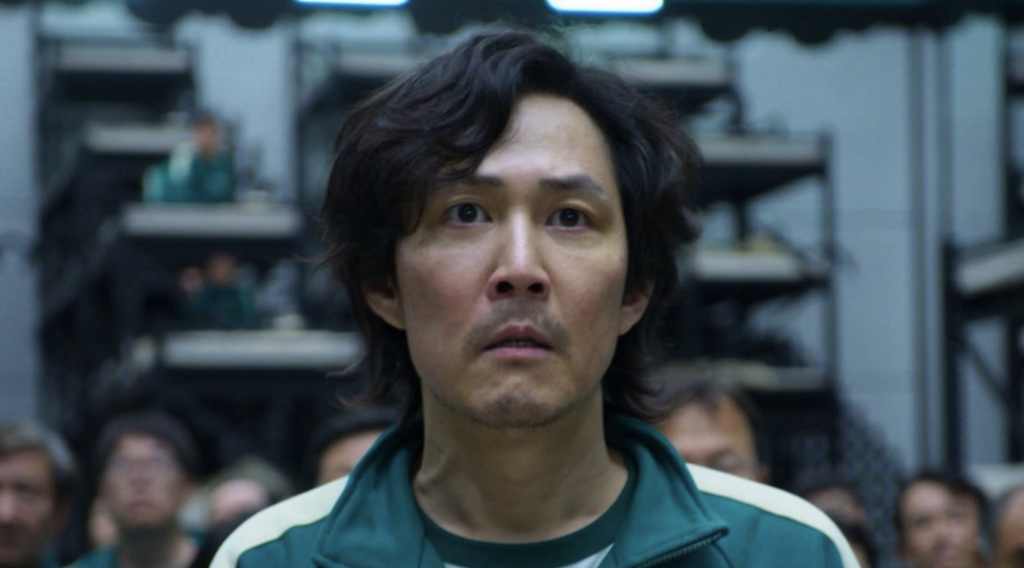Squid Game: Death by Greed

Robert Maure ‘25 / Emertainment Monthly Staff Writer
How far would you go and who would you double-cross just to pay off crippling debt? Korean drama show and newly-inducted pop culture icon Squid Game is largely responsible for the formation of this question in recent media. Setting its mark as the biggest K-Drama to hit the United States since director Bong Joon-ho’s Oscar-winning film Parasite in late 2019, Hwang Dong-hyuk’s Squid Game has successfully broken the internet with its rise to fame throughout the month of October to early November of 2021. Although the hype and love for Squid Game have undoubtedly slowed down since its initial rise to stardom, this story’s setting, characters, and narrative continue to make a lasting impression on audiences.
Minor spoilers ahead.
Much like Bong Joon-ho’s Parasite, Squid Game outlines the evident divide between the rich and poor in society, albeit in a far more grotesque manner. In this case, Squid Game circulates the life of Seong Gi-hun (Lee Jung-jae) and his struggles as both a caretaker for his frail mother and a distant father for his daughter, of whom he is quickly losing custody. To make matters worse, Gi-hun’s frequent gambling and carelessness have turned his financial situation into a crisis as loan sharks set out to take what’s left, his life. Gi-hun’s situation grabs the attention of an anonymous businessman (Gong Yoo), who convinces Gi-hun to join the “Squid Games” in order to wipe away his debt. Seeing no other feasible option, Gi-hun, alongside 455 other individuals that are also in critical financial debt, accept the offer and would soon find themselves stripped of their belongings, given green jumpsuits with different numbers, and face to face with a fate yet to be foretold.

On their first day of arrival, Gi-hun and the other contestants are introduced to the infamously masked pink soldiers and the “Squid Game” itself. The rules are simple: successfully compete in six classic Korean kids games in order to win ₩45.6 billion, the equivalent of $38.6 million. Failure to comply with the soldiers or complete the games results in “elimination,” either via the hand of one of the pink soldiers or through another gruesome method of murder. Each elimination adds funds to a glass piggy bank, which remains hung above the contestants’ corners throughout their time in the games in order to remind them of what they’re fighting for.
Having been introduced to the grim reality of the games, the contestants are pressured to work with or against each other in order to stand on top. Soon enough, various groups amongst the contestants are formed, with Gi-hun quickly finding his role in a group of underdogs. Amongst Gi-hun’s group are his childhood friend Cho Sang-woo (Park Hae-soo), Pakistanian Ali Abdul (Anupam Tripathi), and Player 001 (Oh Yeong-su), an old man with a brain tumor who forgot his own name. Whilst these four are the main characters of our story, they are merely cogs in the emotional rollercoaster that is Squid Game.

As a whole, Squid Game is on par with many pop culture hit shows in that it is a show to be witnessed rather than explained. There is far more to discuss beyond Gi-hun’s character arc and journey throughout the show and even more characters to be invested in. Every side character in the show, from the contestants to the soldiers to the head honchos in charge of all the chaos, presents themselves in a manner that is always memorable, regardless of how long they’re on screen and whether or not they’re even given a name. At times, even characters that are purposefully written to be hated can be likened to a certain extent, which is a very rare sight to see in most shows due to the difficulty in orchestrating the proper characteristics of a character. Not to mention, the actors must be on board and ready to give their all when it comes to fulfilling such roles, a duty of which is successfully fulfilled by Squid Game’s amazing cast. Such a concept is increasingly evident with the hundreds of background actors who play as the massive army of pink soldiers and their newly iconic circle, triangle, and square-faced masks. These actors, in particular, are phenomenal to witness as the symbols on their masks depict both their personalities and their social class amongst the soldiers; circles are the silent grunts, triangles are the obedient riflemen, and squares are the commanding officers.

With all of this in mind, the biggest advice one could give to a new viewer of Squid Game would be to prepare for immense violence and, more importantly, to watch the show in the language it was intended to be viewed in… Korean. Despite how tempting it may be to watch the show’s “Dubbed” version with English voice actors, doing so only destroys the emotional and cultural impact of the story as a whole. Additionally, many important aspects of the story are mistranslated due to Netflix’s poor management of Korean to English translation. Even if you’re not the most comfortable with reading subtitles, know that watching Squid Game in Korean is vital to having an enjoyable viewing experience.
Aside from this advice, there isn’t much else to inform or prepare someone for Squid Game beyond the extent of spoilers. Much like Netflix’s Stranger Things, spoiling the contents of Squid Game only does the show’s cast, crew, and story a major disservice to new viewers. This is especially true in Squid Game’s case since it has quickly become Netflix’s newest prized possession and most viewed show, to the point where it makes Stranger Things’ popularity seem minuscule in comparison. That being said, be sure to check out Squid Game without giving away too much to your friends and even yourself, otherwise, you may be eliminated.